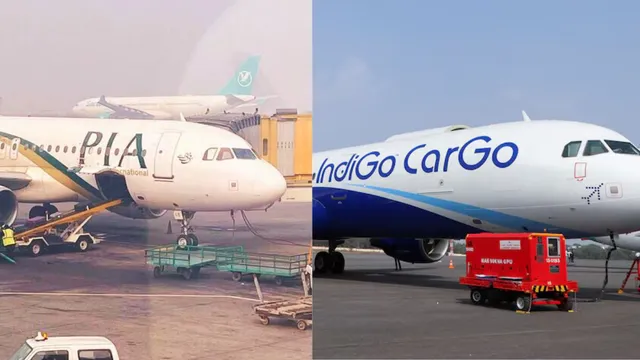- By Ajeet Kumar
- Thu, 01 May 2025 02:36 PM (IST)
- Source:JND
Pakistan on April 25 closed its airspace for Indian airlines and said any attempt to divert the water meant for it under the Indus Water Treaty would be considered an Act of War. Subsequently, India also imposed similar restrictions on April 30, Wednesday amid escalating tensions with the neighbouring country in the wake of the Pahalgam terror attack. A NOTAM (Notice to Airmen) was issued that bars Pakistan flights from using the Indian airspace. Pakistan’s national carrier on Wednesday cancelled all flights to and from Gilgit, Skardu and other northern areas in Pakistan-occupied Kashmir due to security reasons, local media reports said.
Impact of Pakistan airspace closure on Indian airlines
The tit-for-tat move has cost both countries as the airlines have to reroute flights, thus increasing flight timings and fuel usage. Indian airlines such as Indigo and Air India have maximum international flights which were using Pakistani airspace to reach destinations. With Pakistan's move, these airlines have to suffer extra burden. On the passengers aspect, they have to sit extra hours. As per the news agency PTI, around 800 international flights are operated by Indian carriers each week that use Pakistani airspace. As per the news agency, Indian airlines are losing nearly USD 70-80 crores weekly, which roughly translates to USD 300 to 310 crores a month. A senior airline official told PTI, “The additional time for a 16-hour flight to North America will be around 1.5 hours.” That extra time comes with higher operational costs.
READ: India Closes Airspace For Pakistani Flights, Issues NOTAM Amid Pahalgam Terror Attack Fallout
Pakistan loses millions in overflight revenue
On the other hand, Pakistan's economy may face significant challenges due to the loss of a key revenue stream from overflight fees, with potentially severe implications. Overflight fees are charges imposed by a country’s government or aviation authority on foreign aircraft traversing its airspace. These fees cover the use of airspace, air traffic control, and related services, with costs varying based on aircraft type, size, and distance travelled.
For Pakistan, these fees are a vital income source. Reports indicate that in 2019, Pakistan charged approximately USD 580 for a Boeing 737, with higher rates for larger planes, losing an estimated USD 2,32,000 daily when it closed its airspace after the Pulwama attack. The decision to restrict Indian flights has drawn criticism, as experts warn it could damage Pakistan’s economy. With Indian airlines now rerouting to bypass Pakistan, the country is forfeiting significant overflight revenue.
India's airspace closure to hit Pakistan hard: Expert
Pakistan's decision to block Indian airlines from using their airspace will have a limited impact on its southern and western flight operations but will significantly affect northern routes, particularly from New Delhi, according to Air Marshal (Retd) Sanjeev Kapoor. However, Kapoor said India's decision to close its airspace to Pakistan's airlines in the wake of the April 22 Pahalgam terror attack is expected to severely disrupt Pakistan International Airlines (PIA) operations, increasing flight times and costs.
#WATCH | Noida, UP: On India shutting airspace for Pakistan airlines, Air Marshal Sanjeev Kapoor (Retired) says, " ...Pakistan had already banned all Indian airlines from their airspace, but we did it yesterday. So the flights that go to Kuala Lumpur from Islamabad, which take 5… pic.twitter.com/blm6wVAMBo
— ANI (@ANI) May 1, 2025
In a self-made video, Marshal Kapoor explained, "Our flights operating from North India, international flights, especially from Delhi, get affected because we have to go to Gujarat and thereafter follow the westbound route over the Arabian Sea into the UAE and then further on. However, international flights operate south of Gujarat, specifically from Mumbai and Ahmedabad. Bangalore, Hyderabad, and Chennai - they are not affected at all." "So there is not much implication for any of the flights operating from the southern Peninsula in our country except for flights operating out of the Delhi area for us," he added.
Big blow to struggling PIA
For Pakistan, however, the implications are far-reaching. Kapoor noted that tactical factors, such as longer routes due to the airspace closure, will cause higher fuel consumption, delayed schedules, and reduced aircraft utilisation, significantly denting PIA's operating costs.
"The flights originating from Islamabad to Kuala Lumpur of Pakistan International Airlines, which generally take about 5 hours 30 minutes, will now take 8 hours 30 minutes... Any aircraft originating from Pakistan that needs to travel to, say, Bangladesh or Sri Lanka will have to take a longer route over the sea...This will lead to increased flying time, increased operating costs, and increased tickets (prices). This will lead to increased turnaround times and a shortage of aircrew. The same aeroplane will have to be rotated back, which will be further delayed...This will lead to less utilisation of these aeroplanes," he added.
(With inputs from agencies)

